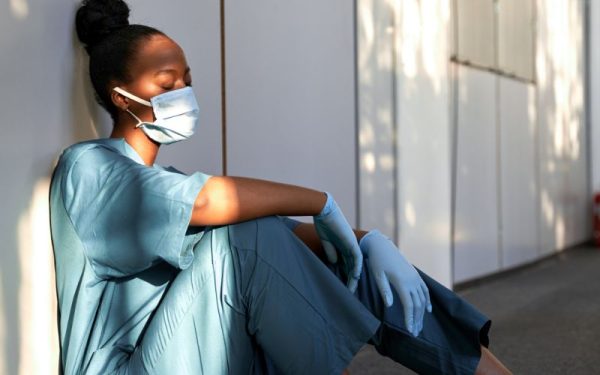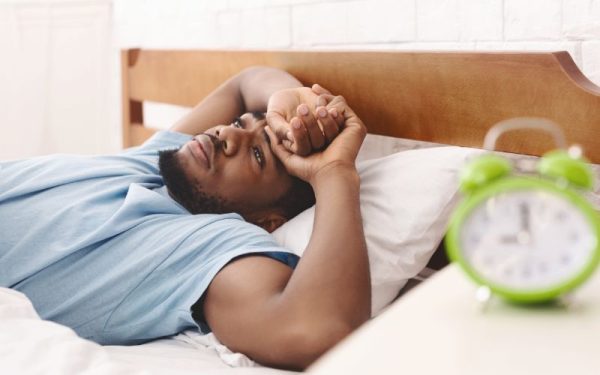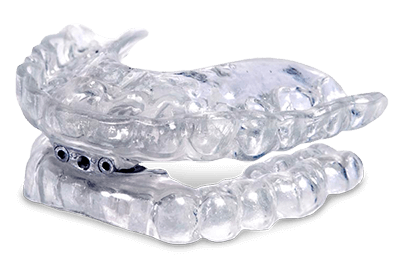The Importance of Quality Sleep
Having a peaceful night’s rest shouldn’t be a luxury— in fact, quality sleep is the very foundation of optimal health. During rest, our body repairs, restores, and prepares for the challenges and adventures of the next day. When our sleep is interrupted, both our physical health and mental wellness are impacted.
The longer we go without good sleep, the more detrimental the effects can become. Sleep disorders such as obstructive sleep apnea can not only wreak havoc on your sleep cycle but also impact your physical wellness. That is why our expert sleep dentist, Dr. Sheehan is proud to offer effective sleep apnea solutions for patients in the Shelby, Bloomfield Hills, Rochester, and surrounding areas.
What is Obstructive Sleep Apnea?
Sleep apnea is the complete stoppage of breathing that occurs several or more times every night. There are three types of sleep apnea — obstructive sleep apnea, central sleep apnea, and complex sleep apnea. Each of these conditions stops breathing but does so due to different reasons and require a different approach to treatment.
Obstructive sleep apnea (OSA) is the most common form and occurs when the muscles in the back of your throat relax while you’re sleeping. This causes the tissues to collapse, blocking the airway. When airflow is interrupted, the oxygen level in your blood decreases dramatically. As soon as your brain notices the reduction in oxygen, it will jolt you awake so you can start breathing again.
Even though a sleep apnea patient can stop breathing up to 30 times or more throughout the night, most patients don’t recall being awakened by their sleep apnea. This nightly pattern prevents you from experiencing a healthy sleep cycle, deprives your body and brain of much-needed oxygen, and it can rob you of your energy during the day.

Identifying Sleep Apnea
Heavy snoring that’s often punctuated by loud gasping noises is a common indicator of sleep apnea. However, not every person who snores has sleep apnea and vice versa. Additionally, daytime symptoms of sleep apnea can also include morning headaches or dry mouth, mood swings, irritability, impaired memory, and a lack of motivation. If you or your partner experience non-sleep apnea-related snoring, the experts at Oakland Family Dental also offer comfortable solutions for snoring.
Dentists have advanced knowledge of the airway — the part of the body where sleep apnea occurs. As an experienced sleep dentist, Dr. Sheehan will often discover signs of sleep apnea in our patients during regular dental checkups.
Oral Symptoms of Sleep Apnea
Common oral symptoms of sleep apnea that Dr. Sheehan notices in our patients include:
- Worn-down teeth
- Scalloped tongue (wavy patterns on the side of the tongue)
- Grinding or clenching of teeth
- Tongue thrusting (tongue presses against incisors, causing misalignment)
- Enlarged tonsils or an elongated uvula
- Mandibular Tori (bony outgrowths on your teeth)
- TMD (pain or discomfort in temporomandibular joints located beneath your ears)
How Sleep Apnea Impacts Your Health
Sleep apnea can stop your breathing more than several times every night. Without treatment, this dangerous sleep disorder can be life-threatening. The continued reduction in your blood oxygen levels negatively impacts all of your body’s systems leading to major health problems.
Learning about the symptoms of sleep apnea will help you determine if it’s time to seek professional care with our experienced sleep dentist, Dr. Sheehan. If you snore loudly and you notice additional symptoms of sleep apnea such as feeling tired and listless during the day, Dr. Sheehan will get you the help you need. The sooner you get treatment for your sleep apnea, the healthier you’ll be.
Health Risks of Untreated Sleep Apnea
Additional health risks that have been scientifically linked to OSA include:
- Cardiovascular complications
- Type 2 diabetes
- High blood pressure
- Depression
- Kidney disease
- Erectile dysfunction
- GERD
- Hypothyroidism
- High cholesterol


Sleep Apnea and Weight
Carrying extra weight can make us tired, unmotivated, and lead to adverse other conditions. Unfortunately, there is a significant connection between weight and sleep apnea, which means it’s all the more important to keep extra pounds at bay. Carrying excess weight, especially around the neck, can affect your ability to breathe properly during rest and lead to sleep apnea. What’s worse, sleep apnea can also cause you to gain weight. In a 2011 study, researchers from the International Journal of Obesity found that “sleep problems likely contribute to weight gain.” A 2013 study supporting these claims found that men who don’t sleep enough will often gain extra weight.
Many people assume that losing weight involves big changes to their routine, but small healthy acts performed on a consistent, daily basis can make all the difference. If you are accustomed to a sedentary lifestyle, taking a short walk in the morning and in the evening can be a great way to get started. Incorporating fun activities like dancing, yoga, or group activities into your routine can help shift the idea of working out from something that “needs to be done” to something you look forward to.
If you’re the type of person who struggles with your eating habits, start small and explore your relationship with food. Adding in healthy fruits, vegetables and other foods that you love can make “dieting” feel less of an insurmountable task. If you turn to food during times of stress, learning healthy coping mechanisms can make all the difference.
While genetics can play a role in obesity and maintaining a healthy weight is a struggle for many people, doing so can help prevent other sleep apnea-related health issues including cardiovascular disease and diabetes.

Sleep Apnea In Children
Children require much more sleep than adults because their bodies need lots of energy to grow and develop properly. Because of this, your child can be even more sensitive to sleep apnea. When their sleep is interrupted, it can take a negative toll on their mental and physical health leading to a variety of behavior problems. Oftentimes, these problems can be misdiagnosed as other issues such as ADHD. Both children and adults with obstructive sleep apnea can experience restless sleep, loud snoring, and daytime drowsiness. Other common symptoms in children with sleep apnea include:
- Bed wetting
- Mouth breathing during sleep
- Behavioral & academic issues
- Weight gain
- Night sweats
- Sleepwalking
- Difficulty concentrating
If you notice any of the above signs, Dr. Sheehan recommends scheduling a sleep study. This can ensure a proper diagnosis so that your child can get the treatment they need and sleep easy.

Sleep Apnea and Pregnancy
Sleep apnea can be especially dangerous to pregnant patients leading to health complications for both mother and child. Due to the hormonal changes and elevated levels of estrogen, pregnant patients are at a higher risk of developing sleep apnea as well.
Untreated sleep apnea has been associated with pregnancy complications including gestational diabetes, hypertension, fetal growth restrictions, prolonged labor, and Caesarean sections. In severe cases of sleep apnea, patients are also at risk for developing obesity hypoventilation syndrome. OHS is a condition where the body fails to breathe fast enough which can result in elevated blood carbon dioxide levels and low blood sugar levels, which can harm both you and your baby.
Fortunately, our sleep dentist, Dr. Sheehan provides effective sleep apnea solutions to help you sleep easier while protecting the health of you and your unborn child.
Treatment Options
Traditionally, a CPAP (continuous positive airway pressure) machine is the first type of therapy for treating sleep apnea. A CPAP machine provides a steady stream of pressurized air through a mask that is worn during sleep. This keeps the airway open which allows the patient to breathe easier which is why it is highly prescribed for even severe cases of sleep apnea.
The problem is that most people find CPAP to be uncomfortable, loud, and bulky, and many stop treatment prematurely because of it. Untreated sleep apnea can lead to serious irreversible conditions which is why our dedicated professionals at Oakland Family Dental offer a variety of sleep apnea solutions and CPAP alternatives.
We understand that no two patients are alike which is why there shouldn’t be a one-size-fits-all approach when it comes to your treatment plan. Dr. Sheehan will work with you to create a personalized solution you can be comfortable with.
Frequently Asked Questions
What are the risk factors for sleep apnea?
Sleep apnea can affect anyone at nearly any age. However, men are two or three times more likely to suffer from sleep apnea than women and older adults are at a higher risk than younger adults and children. Other risk factors of obstructive sleep apnea include:
- Obesity
- Smoking tobacco
- Drinking alcohol, especially before sleep
- Family history
- Nasal congestion
- Large neck circumference
How can I treat sleep apnea at home?
While professional intervention and treatment is needed to treat your sleep apnea, certain lifestyle changes can help reduce symptoms including:
- Regular exercise
- Maintaining a healthy weight
- Using a humidifier to open up your airways
- Avoiding alcohol consumption
- Avoiding smoking
What are the types of sleep apnea?
Obstructive Sleep Apnea (OSA) — With this form of sleep apnea, the muscles of the throat relax while you’re sleeping, causing the tissue to fall back and block the airway. This is the most common form of sleep apnea and the easiest to treat. Treatments can include CPAP, oral appliance therapy, or even surgical means and are aimed at removing the obstruction so that you can breathe and sleep easier.
Central Sleep Apnea (CSA) — This form of sleep apnea is a bit more complicated and can’t be treated by a dentist. The brain struggles to communicate with the muscles responsible for breathing due to an underlying neurological issue. Treatment is aimed at treating the underlying issue and can include medications, additional therapies, CPAP, or other devices aimed at delivering pressurized air to you while you sleep.
Complex (Mixed) Sleep Apnea (MSA) — As the name suggests, this type of sleep apnea is complex as patients exhibit signs from both OSA and CSA. Treatments may be designed to remove any obstruction in the throat while also treating the underlying issues responsible for the symptoms.
Let Us Help Protect Your Health Today
Sleep apnea can diminish your energy, affect your mood, and put you at risk for health conditions. By protecting your sleep, you can make a huge impact on your quality of life. Our Michigan dentist can help patients in Shelby, Bloomfield Hills, Rochester, or the surrounding areas get better sleep and reclaim their health. Contact our Waterford office at (248) 674-0384 to schedule a consultation with Dr. Sheehan or click the button to the right to fill out our contact form and a friendly team member will return your message shortly.

